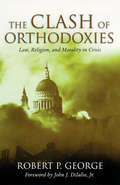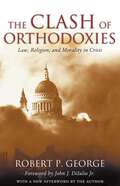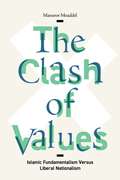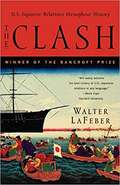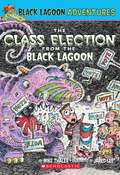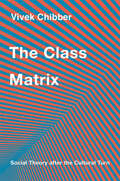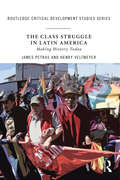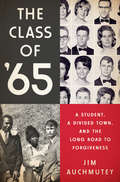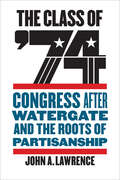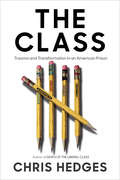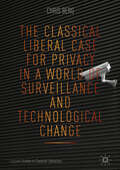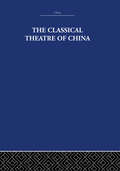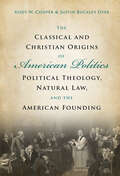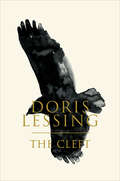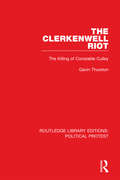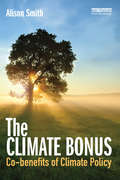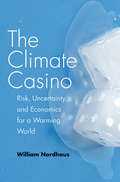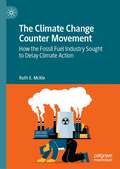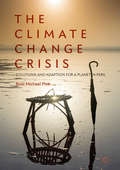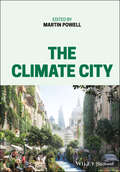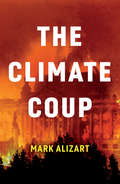- Table View
- List View
The Clash of Orthodoxies: Law, Religion, and Morality in Crisis
by Robert P. GeorgeIt is a common supposition among many of our cultural elites that a constitutional "wall of separation" between church and state precludes religious believers from bringing their beliefs to bear on public matters. This is because secular liberals typically assume that their own positions on morally charged issues of public policy are the fruit of pure reason, while those of their morally conservative opponents reflect an irrational religious faith. In The Clash of Orthodoxies Robert George shows that this supposition is wrong on both counts.Challenging liberalism's claim to represent the triumph of reason, George argues that on controversial issues like abortion, stem-cell research, euthanasia, homosexuality, and same-sex marriage, traditional Judeo-Christian beliefs are actually rationally superior to secular liberal alternatives. Drawing on the natural law philosophical tradition, George demolishes various secularist pretenses, such as the notion that the very young and very old among us are somehow subpersonal and not worthy of full legal protection. He reveals the dubious person/body dualism implicit in secularist arguments, and he demonstrates the flawed reasoning behind the idea that the state ought to be neutral regarding competing understandings of the nature and value of marriage.George also revisits the controversy surrounding his participation in the First Things "End of Democracy?" symposium, in which he considered the relevance of Catholic teachings regarding the legitimacy of political regimes to the contemporary American situation. George argues that because natural law and natural rights doctrine lie at the foundation of the American republic, the judicial reading of the Constitution that has undermined democracy in order to enshrine the secularist agenda is deeply flawed.In advancing his thesis, George argues for a return to old-fashioned liberalism, a worldview that he claims is best exemplified by Pope John Paul II, whose teachings laud democracy, religious liberty, and economic freedom while also recognizing the demands of civil rights, social and economic justice, and the principle of subsidiarity. These demands restrain Catholics--and indeed all people of faith--from making personal freedom an absolute, and George takes to task those political leaders who, though believers, have denied or ignored the political responsibility this entails.The Clash of Orthodoxies is a profoundly important contribution to our contemporary national conversation about the proper role of religion in politics. The lucid and persuasive prose of Robert George, one of America's most prominent public intellectuals, will shock secular liberals out of an unwarranted complacency and provide powerful ammunition for embattled defenders of traditional morality.
The Clash of Orthodoxies: Law, Religion, and Morality in Crisis
by Robert P. GeorgeIn The Clash of Orthodoxies: Law, Religion, and Morality in Crisis, Robert George tackles the issues at the heart of the contemporary conflict of worldviews. Secular liberals typically suppose that their positions on morally charged issues of public policy are the fruit of pure reason, while those of their morally conservative opponents reflect an irrational religious faith. George shows that this supposition is wrong on both counts. Challenging liberalism's claim to represent the triumph of reason, George argues that on controversial issues like abortion, euthanasia, same-sex unions, civil rights and liberties, and the place of religion in public life, traditional Judeo-Christian beliefs are rationally superior to secular liberal alternatives. The Clash of Orthodoxies is a profoundly important contribution to our contemporary national conversation about the proper role of religion in politics. The lucid and persuasive prose of Robert George, one of America's most prominent public intellectuals, will shock liberals out of an unwarranted complacency and provide powerful ammunition for embattled defenders of traditional morality.
The Clash of Values: Islamic Fundamentalism Versus Liberal Nationalism
by Mansoor MoaddelMuch of the Middle East and North Africa still appears to be in a transitional period set in motion by the 2011 Arab uprisings, and the political trajectory of the region remains difficult to grasp. In The Clash of Values, Mansoor Moaddel provides groundbreaking empirical data to demonstrate how the collision between Islamic fundamentalism and liberal nationalism explains the region’s present and will determine its future.Analyzing data from over 60,000 face-to-face interviews of nationally representative samples of people in seven countries—Egypt, Iraq, Lebanon, Pakistan, Saudi Arabia, Tunisia, and Turkey—Moaddel reveals the depth and breadth of the conflict of values. He develops measures of expressive individualism, gender equality, secularism, and religious fundamentalism and shows that the factors that strengthen liberal values also weaken fundamentalism. Moaddel highlights longitudinal data showing changes in orientations toward secular politics, Western-type government, religious tolerance, national identity, and to a limited extent gender equality, as well as a significant decline in support for political Islam, over the past decade. Focusing on these trends, he contends that the Arab Spring represents a new phase of collective action rooted in the spread of the belief in individual liberty. Offering a rigorous and deeply researched perspective on social change, The Clash of Values disentangles the Middle East and North Africa’s political complexity and pinpoints a crucial trend toward liberal nationalism.
The Clash: U.S.-Japanese Relations Throughout History
by Walter LaFeberWhen Commodore Matthew Perry sailed into Tokyo harbor in July 1853, opening Japan to the West, a century and a half of economic, cultural, and occasionally violent clashes between Americans and Japanese began. Walter LaFeber has written the first book to tell the entire story behind the disagreements, tensions, and skirmishes between Japan―a compact, homogenous, closely knit society terrified of disorder―and America―a sprawling, open-ended society that fears economic depression and continually seeks an international marketplace. Using both American and Japanese sources, LaFeber provides the history behind the vicissitudes of rearming Japan, the present-day tensions in U.S.-Japan trade talks, Japan's continuing importance in financing America's huge deficit, and both nations' drive to develop China―a shadow that has darkened American-Japanese relations from the beginning.
The Class Election From The Black Lagoon (Black Lagoon Adventures #3)
by Mike ThalerEveryone has to run for something in the class election. But you'd rather run for your life! Even worse, you're running against Doris, who's bought whole class's votes with ice cream. And if you lose the election, they might vote you out of school!
The Class Matrix: Social Theory after the Cultural Turn
by Vivek ChibberAn influential sociologist revives materialist explanations of class, while accommodating the best of rival cultural theory. Following the collapse of the Soviet Union, analysis of class and other basic structures of capitalism was sidelined by theorists who argued that social and economic life is reducible to culture—that our choices reflect interpretations of the world around us rather than the limitations imposed by basic material facts. Today, capitalism is back on the agenda, as gross inequalities in wealth and power have pushed scholars to reopen materialist lines of inquiry. But it would be a mistake to pretend that the cultural turn never happened. Vivek Chibber instead engages cultural theory seriously, proposing a fusion of materialism and the most useful insights of its rival. Chibber shows that it is possible to accommodate the main arguments from the cultural turn within a robust materialist framework: one can agree that the making of meaning plays an important role in social agency, while still recognizing the fundamental power of class structure and class formation. Chibber vindicates classical materialism by demonstrating that it in fact accounts for phenomena cultural theorists thought it was powerless to explain. But he also shows that aspects of class are indeed centrally affected by cultural factors. The Class Matrix does not seek to displace culture from the analysis of modern capitalism. Rather, in prose of exemplary clarity, Chibber gives culture its due alongside what Marx called “the dull compulsion of economic relations.”
The Class Struggle in Latin America: Making History Today (Routledge Critical Development Studies)
by Henry Veltmeyer James PetrasThe Class Struggle in Latin America: Making History Today analyses the political and economic dynamics of development in Latin America through the lens of class struggle. Focusing in particular on Peru, Paraguay, Chile, Colombia, Argentina, Brazil and Venezuela, the book identifies how the shifts and changing dynamics of the class struggle have impacted on the rise, demise and resurgence of neo-liberal regimes in Latin America. This innovative book offers a unique perspective on the evolving dynamics of class struggle, engaging both the destructive forces of capitalist development and those seeking to consolidate the system and preserve the status quo, alongside the efforts of popular resistance concerned with the destructive ravages of capitalism on humankind, society and the global environment. Using theoretical observations based on empirical and historical case studies, this book argues that the class struggle remains intrinsically linked to the march of capitalist development. At a time when post-neo-liberal regimes in Latin America are faltering, this supplementary text provides a guide to the economic and political dynamics of capitalist development in the region, which will be invaluable to students and researchers of international development, anthropology and sociology, as well as those with an interest in Latin American politics and development.
The Class of '65: A Student, a Divided Town, and the Long Road to Forgiveness
by Jim AuchmuteyIn the midst of racial strife, one young man showed courage and empathy. It took forty years for the others to join him. . . Being a student at Americus High School was the worst experience of Greg Wittkamper’s life. Greg came from a nearby Christian commune, Koinonia, whose members devoutly and publicly supported racial equality. When he refused to insult and attack his school’s first black students in 1964, Greg was mistreated as badly as they were: harassed and bullied and beaten. In the summer after his senior year, as racial strife in Americus--and the nation--reached its peak, Greg left Georgia. Forty-one years later, a dozen former classmates wrote letters to Greg, asking his forgiveness and inviting him to return for a class reunion. Their words opened a vein of painful memory and unresolved emotion, and set him on a journey that would prove healing and saddening. The Class of ’65 is more than a heartbreaking story from the segregated South. It is also about four of Greg’s classmates--David Morgan, Joseph Logan, Deanie Dudley, and Celia Harvey--who came to reconsider the attitudes they grew up with. How did they change? Why, half a lifetime later, did reaching out to the most despised boy in school matter to them? This noble book reminds us that while ordinary people may acquiesce to oppression, we all have the capacity to alter our outlook and redeem ourselves.
The Class of '74: Congress after Watergate and the Roots of Partisanship
by John A. LawrenceA thought-provoking look at the game-changing congressional Class of 1974.In November 1974, following the historic Watergate scandal, Americans went to the polls determined to cleanse American politics. Instead of producing the Republican majority foreshadowed by Richard Nixon’s 1972 landslide, dozens of GOP legislators were swept out of the House, replaced by 76 reforming Democratic freshmen. In The Class of '74, John A. Lawrence examines how these newly elected representatives bucked the status quo in Washington, helping to effectuate unprecedented reforms. Lawrence’s long-standing work in Congress afforded him unique access to former members, staff, House officers, journalists, and others, enabling him to challenge the time-honored reputation of the Class as idealistic, narcissistic, and naïve "Watergate Babies." Their observations help reshape our understanding of the Class and of a changing Congress through frank, humorous, and insightful opinions. These reformers provided the votes to disseminate power, elevate suppressed issues, and expand participation by junior legislators in congressional deliberations. But even as such innovations empowered progressive Democrats, the greater openness they created, combined with changing undercurrents in American politics in the mid-1970s, facilitated increasingly bitter battles between liberals and conservatives. These disputes foreshadowed contemporary legislative gridlock and a divided Congress.Today, many observers point to gerrymandering, special-interest money, and a host of other developments to explain the current dysfunction of American politics. In The Class of '74, Lawrence argues that these explanations fail to recognize deep roots of partisanship. To fully understand the highly polarized political environment that now pervades the House and American politics, we must examine the complex politics, including a more open and contentious House, that emerged in the wake of Watergate.
The Class: Trauma and Transformation in an American Prison
by Chris Hedges"This book could change everything. It could change our minds. It could buttress our hearts. It could make graspable why today&’s prisons are contemporary slave plantations. I couldn&’t put it down and I tried." —Alice Walker, author of The Color PurpleA haunting and powerfully moving book that gives voice to the poorest among us and lays bare the cruelty of a penal system that too often defines their lives.In this unforgettable work, Pulitzer Prize-winning journalist Chris Hedges, who brought us War Is a Force That Gives Us Meaning and America, The Farewell Tour, provides an intimate and moving look at the lives of the students he teaches in a maximum-security prison. He and twenty-eight students (who together are serving a combined sentence of 515 years) read and discussed plays by Amiri Baraka, John Herbert, Tarell Alvin McCraney, Miguel Piñero and August Wilson, among others. Together they set out to write an original play drawing on their experiences of poverty, institutionalized racism, police brutality and mass incarceration. (Their play, Caged, would eventually perform to sold-out audiences and be published as a book in 2020.) In The Class, the men—some of whom know they will die in prison—give voice to the struggles of grief, shame, injustice, guilt and generational trauma they and their families have endured, as well as to their hopes and dreams. Hedges chronicles with heart-breaking intimacy the emotional struggle for artistic expression that leads to self-awareness, transformation and redemption. The Class is at once a story of creative triumph and a scorching critique of the racialized poverty that plagues North America and what it does to the most vulnerable.
The Classical Debt: Greek Antiquity in an Era of Austerity
by Johanna Hanink“Greek debt” means one thing to the country’s creditors. But for millions who prize culture over capital, it means the symbolic debt we owe Greece for democracy, philosophy, mathematics, and fine art. Johanna Hanink shows that our idealized image of ancient Greece dangerously shapes our view of the country’s economic hardship and refugee crisis.
The Classical Liberal Case for Israel
by Walter E. Block Alan G. FutermanThis book offers a unique perspective on the State of Israel based on classical liberalism, both on a historical and theoretical level. Specifically, it makes a classical liberal and libertarian analysis based upon homesteading and private property rights to defend the State of Israel. As such, this work explores the history of the Jewish State, both to provide a positive case for its right to exist, and to clarify the myths surrounding its origin and development. At the same time, it deals with other relevant related subjects, such as the complex situation between Israel and the Palestinian Arabs, the military campaigns against the Jewish State, the connection between anti-Zionism and anti-Semitism, and Israel’s economic miracle. The thorough analysis presented in this work intends to show not only why the voices and movements against Israel are wrong (including the Boycott, Divestment and Sanctions movement, BDS), but more importantly, why Israel is an example of human flourishing and freedom that every advocate for liberty should celebrate. The Classical Liberal Case for Israel makes the practical and moral case for Israel. It is based on truths and facts that need to be repeated over and over. Block & Futerman understand that the only way to defeat a big lie is with a big truth. Benjamin Netanyahu, Prime Minister of the State of Israel, Jerusalem, Israel Classical Liberalism, often associated with the spread West from Northern Europe in creating free nations, is argued here as applying to Israel, with ancient roots in the principles of human freedom. Vernon L. Smith, Ph.D. Nobel Prize in Economic Sciences (2002), and Professor, George L. Argyros Endowed Chair in Finance and Economics, Professor of Economics and Law, Smith Institute for Political Economy and Philosophy, at Chapman University.
The Classical Liberal Case for Privacy in a World of Surveillance and Technological Change (Palgrave Studies in Classical Liberalism)
by Chris BergHow should a free society protect privacy? Dramatic changes in national security law and surveillance, as well as technological changes from social media to smart cities mean that our ideas about privacy and its protection are being challenged like never before. In this interdisciplinary book, Chris Berg explores what classical liberal approaches to privacy can bring to current debates about surveillance, encryption and new financial technologies. Ultimately, he argues that the principles of classical liberalism – the rule of law, individual rights, property and entrepreneurial evolution – can help extend as well as critique contemporary philosophical theories of privacy.
The Classical Liberal Constitution: The Uncertain Quest for Limited Government
by Richard A. EpsteinAmerican liberals and conservatives alike take for granted a progressive view of the Constitution that took root in the early twentieth century. Richard Epstein laments this complacency which, he believes, explains America's current economic malaise and political gridlock. Steering clear of well-worn debates between defenders of originalism and proponents of a living Constitution, Epstein employs close textual reading, historical analysis, and political and economic theory to urge a return to the classical liberal theory of governance that animated the framers' original constitutional design. Grounded in the thought of Locke, Hume, Madison, and other Enlightenment figures, classical liberalism emphasized federalism, restricted government, separation of powers, and strong protection of individual rights. New Deal progressives challenged this synthesis by embracing government as a force for social good rather than a necessary evil. The Supreme Court has unwisely ratified the progressive program by sustaining many legislative initiatives at odds with the classical liberal Constitution. Epstein addresses both the Constitution's structural safeguards against state power and its protection of individual rights. He sheds light on contemporary disputes ranging from presidential prerogatives to health care legislation, while exploring such enduring topics as judicial review, economic regulation, freedom of speech and religion, and equal protection.
The Classical Theatre of China
by A.C. ScottFirst published in 1957. Besides tracing the history and development of the Peking Theatre, this volume explains acting techniques, stage costume and symbolism, musical forms and the various types of plays.
The Classical and Christian Origins of American Politics: Political Theology, Natural Law, and the American Founding
by Justin Buckley Dyer Kody W. CooperThere has been a considerable amount of literature in the last 70 years claiming that the American founders were steeped in modern thought. This study runs counter to that tradition, arguing that the founders of America were deeply indebted to the classical Christian natural-law tradition for their fundamental theological, moral, and political outlook. Evidence for this thesis is found in case studies of such leading American founders as Thomas Jefferson and James Wilson, the pamphlet debates, the founders' invocation of providence during the revolution, and their understanding of popular sovereignty. The authors go on to reflect on how the founders' political thought contained within it the resources that undermined, in principle, the institution of slavery, and explores the relevance of the founders' political theology for contemporary politics. This timely, important book makes a significant contribution to the scholarly debate over whether the American founding is compatible with traditional Christianity.
The Cleft
by Doris LessingFrom Doris Lessing, "one of the most important writers of the past hundred years" (Times of London), comes a brilliant, darkly provocative alternative history of humankind's beginnings.In the last years of his life, a Roman senator embarks on one final epic endeavor, a retelling of the history of human creation. The story he relates is the little-known saga of the Clefts, an ancient community of women with no knowledge of nor need for men. Childbirth was controlled through the cycles of the moon, and only female offspring were born--until the unanticipated event that jeopardized the harmony of their close-knit society: the strange, unheralded birth of a boy.
The Clerkenwell Riot: The Killing of Constable Culley (Routledge Library Editions: Political Protest #3)
by Gavin ThurstonThis book, first published in 1967, examines the implications of a now-forgotten minor riot that occurred in 1833, a turbulent year with the working classes striving for recognition in a changing social order. A political meeting in London had been declared illegal, the police breaking up the crowd were met with resistance, and in the fracas a policeman was stabbed to death. A bad-tempered inquest followed, at which the jury returned a verdict of justified killing – for which a section of the public hailed them as heroes. This analysis sets the crime and verdict against the political protests of the time.
The Climate Bonus: Co-benefits of Climate Policy
by Alison SmithWe urgently need to transform to a low carbon society, yet our progress is painfully slow, in part because there is widespread public concern that this will require sacrifice and high costs. But this need not be the case. Many carbon reduction policies provide a range of additional benefits, from reduced air pollution and increased energy security to financial savings and healthier lifestyles, that can offset the costs of climate action. This book maps out the links between low carbon policies and their co-benefits, and shows how low carbon policies can lead to cleaner air and water, conservation of forests, more sustainable agriculture, less waste, safer and more secure energy, cost savings for households and businesses and a stronger and more stable economy. The book discusses the ways in which joined-up policies can help to maximise the synergies and minimise the conflicts between climate policy and other aspects of sustainability. Through rigorous analysis of the facts, the author presents well-reasoned and evidenced recommendations for policy-makers and all those with an interest in making a healthier and happier society. This book shows us how, instead of being paralysed by the threat of climate change, we can use it as a stimulus to escape from our dependence on polluting fossil fuels, and make the transition to a cleaner, safer and more sustainable future.
The Climate Casino
by William D. NordhausClimate change is profoundly altering our world in ways that pose major risks to human societies and natural systems. We have entered the Climate Casino and are rolling the global-warming dice, warns economist William Nordhaus. But there is still time to turn around and walk back out of the casino, and in this essential book the author explains how. Bringing together all the important issues surrounding the climate debate, Nordhaus describes the science, economics, and politics involved--and the steps necessary to reduce the perils of global warming. Using language accessible to any concerned citizen and taking care to present different points of view fairly, he discusses the problem from start to finish: from the beginning, where warming originates in our personal energy use, to the end, where societies employ regulations or taxes or subsidies to slow the emissions of gases responsible for climate change. Nordhaus offers a new analysis of why earlier policies, such as the Kyoto Protocol, failed to slow carbon dioxide emissions, how new approaches can succeed, and which policy tools will most effectively reduce emissions. In short, he clarifies a defining problem of our times and lays out the next critical steps for slowing the trajectory of global warming.
The Climate Change Counter Movement: How the Fossil Fuel Industry Sought to Delay Climate Action
by Ruth E. McKieThis book provides an historical account of the emergence and spread of the climate change counter movement across the globe. Drawing on an extensive database developed by the author, the book recounts the development of an international network, taking the reader on a journey through the history of the movement before looking closely at a series of comparative case studies examining movement organisations in different countries.
The Climate Change Crisis: Solutions And Adaption For A Planet In Peril
by Ross Michael PinkThis book explores how the world community will respond to the unfolding humanitarian crisis caused by climate change. It recognises climate change as the greatest threat to human development in the 21st century, bringing with it: flooding, drought, extreme temperatures, health crises, threats to human security and severe harm to economic development.The Climate Change Crisis addresses climate change and its impact as a major threat for countries around the world. Through a collection of interviews with leading environmentalists and exploration into new innovations that can offer hope and protection for billions of people, this book presents an interdisciplinary approach towards understanding the paramount health and development challenges of climate change.This timely and informative book cuts across several disciplines, including human rights, public policy, international relations, national refugee policy, and migration studies.
The Climate City
by Martin PowellTHE CLIMATE CITY Provides professionals in finance, technology, and consulting with solutions for improving the quality of urban life under the changing climate The Climate City provides cutting-edge approaches for developing resilient solutions to combat the effects of climate change in cities throughout the world. Linking finance and technology to policy and innovation, this highly practical resource outlines a global framework for mitigating and adapting to climate change and for effectively planning and delivering a low-carbon future. This book addresses how cities can work effectively with each other to drive change, the importance of strong leadership and international cooperation, the role of innovative finance and technology to identify new economic opportunities, and more. Throughout the book, the authors address future trends such as the changing streetscape, connected infrastructure and eMobility, and autonomous vehicles, drones, and other emerging technologies. Designed to help all stakeholders build a pathway to a less resource-intensive future, The Climate City: Provides in-depth discussion of the technological, financial, and practical aspects of tackling climate change in urban environments Demonstrates why the global economy needs to transition to a low-carbon economy Describes the role of financial institutions and how they can allocate capital more efficiently Explains why and how challenges and priorities are different in the global north and south Illustrates how data can improve the ways cities use energy resources and operate transportation systems Discusses how citizen action can drive a new, more meaningful way of living in cities Features insights from political leaders such as the Mayor of Copenhagen, the Mayor of Los Angeles and the former Mayor of London and Prime Minister of the United Kingdom The Climate City is essential reading for city planners, policy makers, technologists, consultants, finance and business professionals, and general readers wanting to improve the cities in which they work and live.
The Climate Coup
by Mark AlizartInaction by governments in the face of climate change is often attributed to a lack of political will or a denial of the seriousness of the situation, but as Mark Alizart argues in this provocative book, we shouldn’t exclude the possibility that part of the reluctance might be motivated by cynicism and even sheer evil: for some people, there are real financial and political benefits to be gained from the chaos that will ensue from environmental disaster. The climate crisis creates its winners – individuals who orchestrate environmental chaos and bet on the collapse of the world as they bet on declining share values. In the face of this veritable ‘carbofascist’ coup targeting humanity, modifying our behaviour as individuals won’t suffice. We must train our critical attention on those financial and political actors who speculate on catastrophe and, in the light of this, we must rethink the strategy of ecological activism. This is a war to win, not a crisis to overcome.
